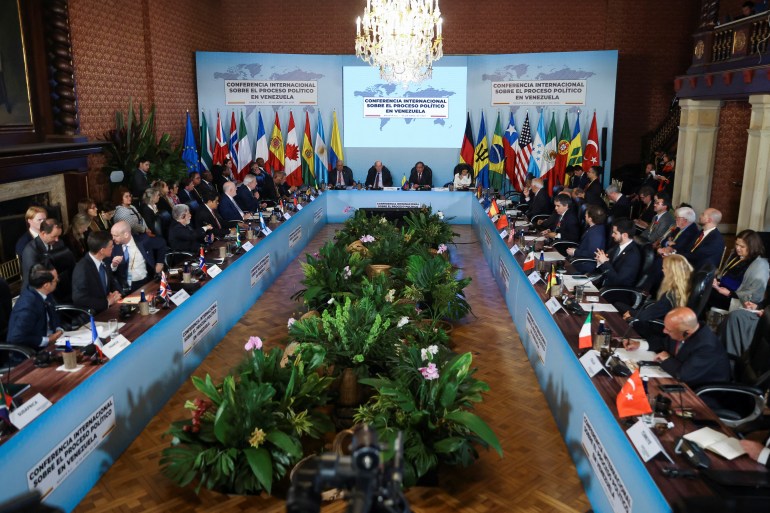President Gustavo Petro calls on leaders from 19 countries and the EU to ‘rebuild the path of peace’ in Latin America.
Colombian President Gustavo Petro has hosted world leaders in Bogotá for a one-day conference to discuss the political situation in Venezuela, where critics accuse the administration of Nicolás Maduro of stifling opposition.
Representatives from 19 countries and the European Union met in the San Carlos Palace on Tuesday, where Petro opened the meeting with a speech.
In it, he called on the international community to lift sanctions against Venezuela, but he also pressed for Maduro to schedule democratic elections in the country.
“The history of Latin America is in our hands,” Petro, Colombia’s first left-wing president, told the diplomats.
He depicted Latin America at a crossroads: Either the attendees could “mark a path that leads toward war and the deconstruction of democracy, or we can rebuild the path of peace and democracy”.

Representatives from Argentina, Brazil, Spain, the United Kingdom and the United States attended the conference, which was meant to reignite stalled talks between Maduro’s administration and Venezuela’s political opposition.
The two sides had previously met in Mexico City to negotiate a resolution to the country’s political impasse, but those talks sputtered last December.
Neither of the opposing parties was in attendance at Tuesday’s conference. But the opposition coalition, the Democratic Unitary Platform, voiced support for the meeting, though some factions questioned Colombia’s role as mediator.
Since its 2018 presidential elections, Venezuela has faced a divided government. Maduro was overwhelmingly reelected for a second six-year term — but only after some of Venezuela’s most prominent opposition parties were barred from participating.
That led critics of Maduro’s socialist government to declare the election illegitimate. After Maduro’s inauguration in January 2019, Juan Guaidó, the opposition leader and then-president of Venezuela’s National Assembly, issued a declaration establishing a state of emergency. He also named himself “interim president” in place of Maduro.
Some countries, like the US, chose to recognise the opposition government over Maduro’s and impose heavy sanctions against Venezuela.
However, in recent months, Latin America has seen a wave of left-wing leaders elected to top positions in government, leading some countries to resume relations with Maduro’s government.
They include Colombia, which restored diplomatic ties under Petro, and Brazil, which renewed ties under leftist President Luiz Inácio Lula da Silva, who was inaugurated in January.
Guaidó himself has lost much of the opposition’s support, and in December, members of the opposition voted to dissolve his government and remove him from the position of “interim president”.
Nevertheless, on Monday, Guaidó crossed the border from Venezuela into Colombia “on foot” in an attempt to meet with the diplomats at Tuesday’s conference.
Colombia’s foreign ministry, however, announced that migration authorities had escorted Guaidó to Bogotá’s El Dorado airport, as he had crossed the border “irregularly”.
On board a plane to the US city of Miami, Guaidó denounced his treatment as an extension of the repression he allegedly received under the Maduro government. “The persecution of the dictatorship unfortunately spread to Colombia today,” he said in a video posted to Twitter.
But on Tuesday, Petro issued a rebuke of the former opposition leader’s statements.
“Mr Guaidó was not expelled,” he wrote on Twitter. “It is better that lies do not appear in politics. Mr Guaidó had an agreement to travel to the US. We allowed it for humanitarian reasons despite the illegal entry into the country.”
